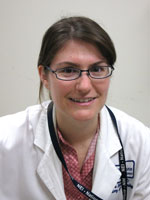
September 2009
Ask the Doctor
What's the difference between a vision screening and a dilated eye exam?

Lisa Faia, M.D.
Clinical Fellow
National Eye Institute
During a vision screening, your eye care professional will check your visual acuity using an eye chart, says NEI ophthalmologist and clinical fellow Dr. Lisa Faia. An eye chart has rows of five letters that get progressively smaller toward the bottom of the chart. If you can't quite make out all the letters on the chart, you may need a more detailed assessment of your eyes.
"Numerous eye conditions are easily treatable if detected early," Dr. Faia says.During a comprehensive dilated eye exam, several painless tests are performed to analyze your overall eye health. Your eye care professional will shine a small light beam into your eyes to see if your pupils constrict properly. He or she will study your eye movements to be sure that your eye muscles are in sync. Your eye care expert will also measure your eye pressure which, if high, could be a sign of glaucoma. In addition, you will receive dilating eye drops to widen your pupils. This will allow your eye care professional to get a good look inside your eyes to detect changes in the optic nerve or retina, which could be signs of glaucoma, diabetic eye disease or macular degeneration.
A comprehensive dilated eye exam is important for identifying vision problems and eye diseases at any stages. However, many eye diseases may not have symptoms in the beginning. "Until people notice vision changes, they may be reluctant to get a dilated eye exam, but numerous eye conditions are easily treatable if detected early," Dr. Faia says.
"Healthy people should have a comprehensive dilated eye exam to assess the status of their eyes and get recommendations as to how frequently they should be seen," Dr. Faia recommends.
Everyone over the age of 60 and people who have diabetes should have comprehensive dilated eye exams each year. Of course, she adds, you should be seen promptly by an eye care professional if you are having problems with your eyes. In addition, you should be checked for glaucoma if you have a family history of the condition, are African American, or are over the age of 40.

